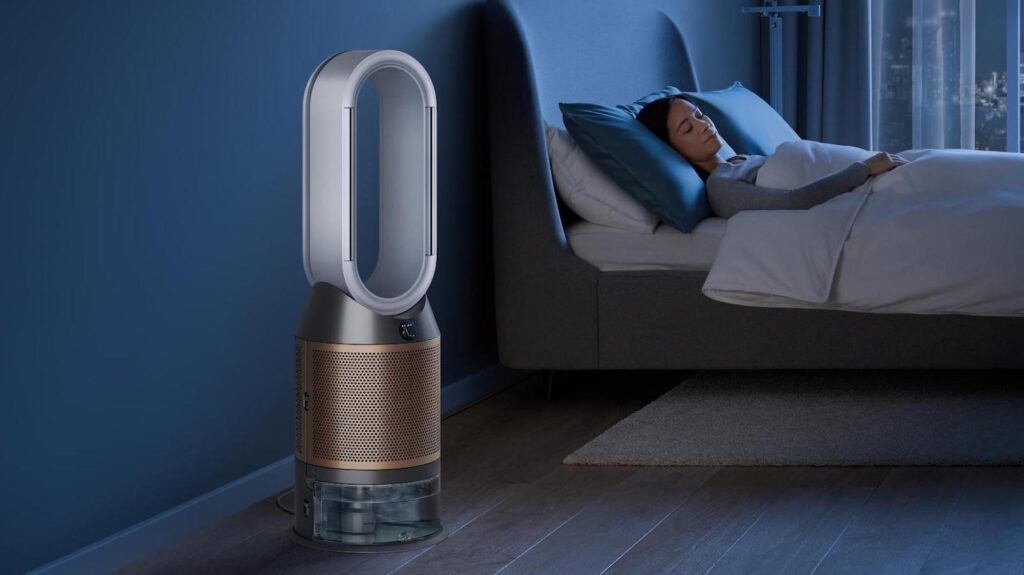Air purifiers are essential tools for creating healthier indoor environments, especially with the increasing focus on air quality improvement and reducing indoor air pollution. They’re particularly beneficial for people with allergies, asthma, or sensitivities to pollutants. Choosing the right air purifier can improve air quality in your home, eliminate odors, and reduce allergens, smoke, and volatile organic compounds (VOCs) in the air. This guide covers the most important features and types of air purifiers, helping you find the best fit for your needs.
Top 10 Smart Air Purifier Under $50
LEVOIT Air Purifier for Home Bedroom, Fresheners Filter
- Refresh Your Air
- 3-Stage Dual Filter Design
- Quiet Function
- Official Levoit Filters
- Fragrant Air Relieves Stress
- Small Powerful Design
- One Button Control
- Save Energy Save Money
FreAire Air Purifier for Home HEPA Air Cleaner
- True HEPA Efficiency Filtration
- High Performance
- 3 Purification Mode
- Timing Function
- Reminder Function
LEVOIT Air Purifiers for Bedroom Home, 3-in-1 Filter Cleaner
- Remove Pollutants Everywhere
- Helps Make Odors Odorless
- Use It Anywhere
- #1 Air Purifier Brand
- Genuine Levoit Filters
- Impressive Particle Filtration
- High Circulation Rate
- Low Decibel Operation
- Enjoy Fragrant Air
VEWIOR Air Purifiers for Home, HEPA Air Purifiers
- H13 True HEPA Filter & Air Quality Monitoring
- Efficient Purification & LED Touch Panel
- Ultra-Quiet & 3 Fan Speeds
- Timer Settings & Energy Saving
- Aromatherapy Diffuser
Air Purifiers for Bedroom Home 430 Sq.Ft, MOOKA H13 HEPA Filter
- 3-Stage High-Performance H13 HEPA Filter
- Compact Size & Universal Voltage
- 15-dB Low Noise Sleep Mode & Ambient Mode
- Enjoy Fragrant Air & 4 Fan Speed
- Safe For Children And Pet
Air Purifiers for Bedroom, Honeyuan H13 HEPA Air Purifier
- H13 High Efficiency Purification
- Portable & Smart Design
- Multifunctional & Flexible
- Safe & Certified
2 Pack TPLMB Air Purifiers for Bedroom H13 HEPA Filter
- Superior Purification
- Enjoy Fragrant Air
- Low Decibel and Night Light
- High Circulation Rate:
- Official Filter Replacement
Air Purifiers for Bedroom, H13 True HEPA Filter for A11ergies
- Highly Efficient Purification
- 50% More Filter Area
- Easy Filter Replacement
- 20dB Silent Operation & Night Lights
- SGS Certified
Air Purifiers for Home Large Room H13 HEPA Filter
- Highly Efficient HEPA Air Purifier
- Suitable for Larger Rooms
- Timer Function & Child Lock
- 3 Fan Modes
- Official filter replacement
Types of Air Purifiers
1. HEPA Filter Technology for Allergen Removal: HEPA (High-Efficiency Particulate Air) filters are standard in most effective air purifiers. They capture up to 99.97% of airborne particles as small as 0.3 microns, making them ideal for allergen removal and dust mite reduction. HEPA air purifiers are recommended for people with asthma or allergy sensitivities, as they can remove pollen, dust, and other airborne irritants.
- Best for: Allergies and asthma, mold and bacteria
- Use case: Bedrooms, children’s rooms, and pet areas
2. Odor Elimination with Activated Carbon Filters: Activated carbon filters are essential for odor elimination as they absorb gases and odors from pets, cooking, smoke, and chemicals. Many air purifiers combine HEPA and activated carbon filters for a comprehensive purification system that can address both particulate and gas-based pollutants.
- Best for: Homes with pets, smokers, and kitchens
- Use case: Odor-eliminating air purifier for bathrooms, kitchens, and living areas
3. VOC Removal for Cleaner Air: VOCs, or volatile organic compounds, are chemicals that can off-gas from paints, cleaning supplies, furniture, and other household items. VOCs can affect air quality and cause health issues, especially in poorly ventilated spaces. Air purifiers with activated carbon filters and other advanced filtration technology can significantly reduce VOCs in the home.
- Best for: Newly renovated rooms, homes with sensitive occupants
- Use case: Air purifier for kitchen smells, living rooms
4. Ionizer vs. Air Purifier: What’s the Difference?
Air purifiers and ionizers both serve to improve air quality but work differently. Ionizers release negatively charged ions into the air to bond with particles, which then settle on surfaces. While effective, ionizers can produce small amounts of ozone, which is not always ideal indoors. Ozone-free air purifiers are generally recommended for families, particularly for children’s rooms or homes with respiratory sensitivities.
- Best for: Ozone-free air purifier for sensitive individuals
- Use case: Bedrooms, playrooms
5. Air Purifiers for Pet Dander Control: For pet owners, a pet-friendly air purifier with a HEPA filter and activated carbon filter is essential. These filters trap pet hair, dander, and pet odors, which can otherwise accumulate and affect indoor air quality.
- Best for: Pet-friendly air purifier for pet hair, dander, and odors
- Use case: Living rooms, pet areas
6. Smoke Filtering for Better Breathing: Whether from wildfire smoke, tobacco, or cooking, smoke particles can linger in the air. An air purifier for wildfire smoke with a high CADR rating is ideal for this purpose. The Clean Air Delivery Rate (CADR) indicates how quickly an air purifier can filter a particular space, making it a key feature to consider for smoke filtering.
- Best for: Top-rated air purifiers for homes with smokers, wildfire areas
- Use case: Large room air purifier with high CADR rating for living spaces, kitchens
7. Portable and Compact Air Purifiers for Flexibility: Portable air purifiers are convenient for travel and moving between rooms. Compact air purifiers are also ideal for small spaces, such as office desks or car air purifiers with USB charging for on-the-go freshness. These units offer flexibility without sacrificing air quality.
- Best for: Travel, small rooms, office desks, car
- Use case: Compact air purifiers for office desks, car air purifier with USB charging
8. Energy-Efficient and Eco-Friendly Air Purifiers: Many modern air purifiers are designed to be energy-efficient and eco-friendly, with lower power consumption. Affordable air purifiers that use less electricity are ideal for those looking to reduce energy costs without sacrificing air quality.
- Best for: Energy-efficient air purifiers under $100 for budget-conscious buyers
- Use case: Environmentally conscious homes, small rooms
9. Low-Noise Air Purifiers for Quiet Spaces: In bedrooms or offices, a quiet air purifier for bedrooms is essential to minimize noise disturbances. Many low-noise air purifiers operate at decibel levels that won’t interfere with sleep or concentration.
- Best for: Bedrooms, office spaces
- Use case: Low-noise air purifier for a restful environment
10. Medical-Grade Air Purifiers for Health Protection: Medical-grade air purifiers, often found in hospitals, provide the highest level of air purification. They are especially useful for people with extreme sensitivities or compromised immune systems. Some models even include UV-C light, which can further reduce bacteria and viruses.
- Best for: Medical-grade air purifiers for hospitals, sensitive individuals
- Use case: Best air purifier with UV-C light for enhanced sanitation
11. Smart Air Purifiers with Wi-Fi Control: Many air purifiers now offer smart technology with Wi-Fi connectivity, allowing users to control settings remotely. Some smart air purifiers have sensors to monitor air quality and adjust filtration levels automatically, offering convenience and better control.
- Best for: Tech-savvy users
- Use case: Smart air purifier with Wi-Fi control for seamless operation
12. Washable Filters for Cost-Efficiency: Air purifiers with washable filters are an eco-friendly choice, reducing waste and the need for frequent replacement filters. These can be an economical option for those looking to save on long-term maintenance costs.
- Best for: Cost-efficient, eco-friendly households
- Use case: Affordable air purifiers with washable filters
Benefits of Using Air Purifier
Using an air purifier can bring a range of health, comfort, and lifestyle benefits by significantly improving indoor air quality. Here are some key advantages:
1. Reduces Allergens and Pollutants: Air purifiers equipped with HEPA filters are highly effective at removing common allergens like dust, pollen, pet dander, and mold spores, which can help reduce allergic reactions and asthma symptoms. By trapping these airborne particles, air purifiers allow people, especially those with respiratory issues, to breathe cleaner, healthier air.
2. Eliminates Odors and Volatile Organic Compounds (VOCs): Odors from cooking, pets, and smoke, as well as volatile organic compounds (VOCs) from cleaning products, furniture, and paints, can all contribute to poor air quality. Air purifiers with activated carbon filters can absorb these unpleasant odors and VOCs, creating a more pleasant and safer indoor environment.
3. Improves Respiratory Health: By reducing the number of airborne irritants and pollutants, air purifiers can alleviate respiratory issues for people with asthma, allergies, or other breathing difficulties. Cleaner air is easier on the lungs, leading to fewer breathing difficulties, better lung function, and overall enhanced respiratory health.
4. Reduces Risk of Illness: Air purifiers with UV-C light technology or antimicrobial filters can eliminate airborne bacteria, viruses, and other pathogens. This feature is particularly beneficial in preventing the spread of colds, flu, and other airborne illnesses within a home or shared space, making air purifiers a valuable health tool, especially during peak cold and flu seasons.
5. Supports Mental Health and Sleep Quality: Breathing cleaner air can improve sleep quality by reducing irritants that may lead to coughing, sneezing, or snoring. Also, some studies suggest that improved air quality can positively affect mental health by reducing stress and boosting overall well-being.
6. Beneficial for Pets and Pet Owners: Pets shed fur and dander, which can trigger allergies and asthma for some people. An air purifier can effectively capture pet-related allergens and odors, creating a more comfortable home for both pets and their owners. This is especially helpful for households with multiple pets or individuals who are sensitive to pet allergens.
7. Removes Smoke and Helps with Wildfire Season: Air purifiers designed to filter smoke particles can be very helpful for those living in areas affected by wildfires or exposed to secondhand smoke. These devices can filter out smoke particles, reducing the smell and health risks associated with smoke inhalation.
8. Decreases Dust Build-Up: By continuously circulating and filtering the air, air purifiers can reduce the overall amount of dust in your home. This minimizes the need for frequent cleaning and keeps your home cleaner with less dust buildup on surfaces and furnishings.
9. Protects Against Mold Growth: Air purifiers can help control mold spores in the air, particularly in humid environments where mold can thrive. Preventing mold spores from settling and reproducing can help protect indoor surfaces from mold growth and prevent health risks related to mold exposure.
10. Eco-Friendly and Energy-Efficient Options Available: Many air purifiers are energy-efficient, requiring minimal electricity to operate while still providing substantial air quality benefits. Additionally, eco-friendly models with washable filters help reduce waste, making air purifiers a sustainable choice for improving indoor air quality.
How Air Purifiers Work
Air purifiers typically operate by pulling in air through various filters, each of which targets different types of particles:
- Pre-Filters capture larger particles like dust, pet hair, and pollen. They are often washable or replaceable and help prolong the life of other filters.
- HEPA Filters (High-Efficiency Particulate Air filters) trap microscopic particles like allergens, dust mites, mold spores, and bacteria. HEPA filters are highly effective, capturing up to 99.97% of particles as small as 0.3 microns.
- Activated Carbon Filters absorb gases, odors, and VOCs. They work by attracting and bonding with these substances, making them ideal for removing smells from cooking, smoke, and pets.
- UV-C Light is used in some air purifiers to neutralize bacteria, viruses, and other pathogens, reducing the risk of airborne illnesses.
- Ionizers release charged ions that attach to particles in the air, causing them to fall out of the air or be captured by a filter. However, ionizers can produce small amounts of ozone, so some people may prefer ozone-free air purifiers.
Conclusion
The best air purifier will depend on your specific needs, such as room size, type of pollutants, and personal sensitivities. Whether you need a high-CADR model for smoke filtering, a medical-grade purifier for allergies, or a portable air purifier for travel, there are options to suit every situation and budget. Prioritize essential features, from HEPA filters to smart controls, to ensure your air purifier offers the air quality improvements you’re seeking.

















